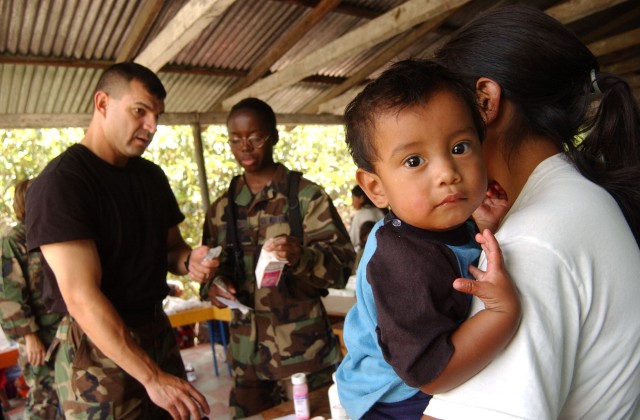
EL HORNO, Honduras (Army News Service, July 6, 2007) - While many Americans prepared to celebrate the 4th of July with cookouts and fireworks, Soldiers and Airman from the Medical Element at Soto Cano Air Base, Honduras, volunteered their four-day weekend to help those in need.
Approximately 40 American and Honduran servicemembers traveled to the village of El Horno, Honduras, to provide medical care to 1,072 patients as part of a Medical Readiness Training Exercise, or MEDRETE.
The team offered health screenings, preventative medicine, general medical care, dental care, pharmacy services and cervical cancer screening.
Maj. Richard Malish, medical flight surgeon, volunteered to head the mission because of his similar experiences in Iraq, Kazakhstan and Kenya.
"You're bringing acute relief to people whose quality of life isn't good," he said. "You bring about improvement in their quality of life, which is a short-term benefit."
Preventive health classes also offered long-term benefits. "We're prolonging their survival curve and quality years of life," he said. "Our hope would be that they develop independence and a system of providing that care for themselves."
"The main goal of preventative medicine is to educate them on how to better care for themselves, versus us having to come back here every year," said Tech. Sgt. Mary Preolette, the NCO in charge of the mission. Families were also given soap, multi-vitamins and anti-parasitic medications.
After preventative medicine classes, nurses took a brief medical history of each patient and assessed his or her conditions. Children and pregnant females were given priority, along with those who traveled the greatest distance to see the doctors.
Of those who needed to see a doctor, many were prescribed medications, most commonly antibiotics, pain relievers, decongestants and antacids.
This was the first MEDRETE for Pharmacy Technician Staff Sgt. Natasha Johnson.
"This is definitely a life-changing experience to see how other cultures live. It gives me a greater respect for everything I have," she said. "I wanted to come and help out any way I could. If I can spend my holiday helping someone else's health, I definitely would."
Doctors from the Honduran Ministry of Health facilitated much of the medical care, working alongside American doctors, nurses and technicians.
(Tech. Sgt. Sonny Cohrs writes for the Joint Task Force-Bravo Public Affairs.)

Social Sharing